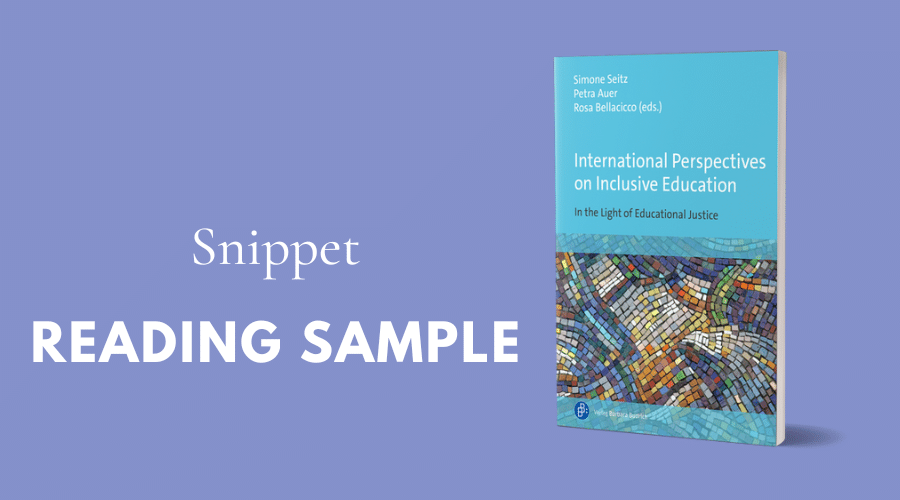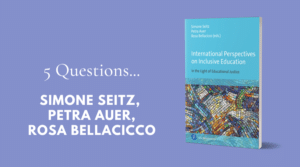International Perspectives on Inclusive Education. In the Light of Educational Justice
edited by Simone Seitz, Petra Auer and Rosa Bellacicco
About the book
International developments and impulses call for the equitable and inclusive design of education systems. This book takes this up and focuses on the often blurred relationship between inclusive education and educational equity. By compiling current research results and theoretical contributions from several European countries on the topic, the authors create an overarching framework for discussion.
Reading sample from pp. 67-72
Giftedness and Achievement within Discourses
by Michaela Kaiser and Simone Seitz
1 Giftedness and achievement
Debates on giftedness and the promotion of achievement have raised broad public awareness in national and international discourses. A closer look at these debates reveals inconsistencies in the relationship between giftedness, achievement and diversity. Based on this presumption, in the following it will be analysed according to which mechanisms knowledge concerning the promotion of giftedness and achievement at school is produced in the scientific discourses.
The starting point is the observation that socially shared or dominant ideas of giftedness and achievement are developed discursively. They are consolidated in scientific publications, in political debates and in educational interactions. What is understood by giftedness and what is recognised as academic achievement and what is not, is negotiated at various levels. Regarding this, public debates and professional discourses overlap and influence each other, for example, through media representations which are impulses both for the science discourse in professional journals as well as for knowledge discourses in schools. Due to changed and accelerated communication practices, impulses and developments at the international level are increasingly interwoven with debates at the national level. In these dynamics, certain ways of understanding prevail, while others penetrate less.
Dominant understandings that influence the development of knowledge and the actions of individuals can be understood as knowledge regimes. These institutionalise a knowledge order for certain fields of practice (Foucault 1977; Berger/Luckmann 1977; Grek 2009) and in this form are influential for educational practice. In concrete terms, this can be seen, for example, in the question of whether an educational institution recognises the practised multilingualism of a child from a family with a migration history as an achievement or evaluates it as a deficit in relation to monolingualism (Gomolla 2009). The corresponding norms and ideas of achievement and giftedness are therefore bound to perspective and interwoven with ideas of normality. Thus, they are also historically changeable and can differ culturally (Baird 2009; Ricken 2018).
This already indicates that the concept of giftedness is the subject of many controversial debates. The term came particularly under criticism in the context of the reception of critical sociological writings on education (Bourdieu 1982). Various operationalisations were presented in the following years, which attempted to describe the relationship between disposition, development and education as well as educational institutions in this regard in more detail (e.g., Sternberg 2003; Renzulli/Reis 2014). In the context of stronger debates and research activities on output of schools, the term was again increasingly included and discussed in-depth in connection with the concept of achievement (International Panel of Experts for Gifted Education [iPEGE] 2009; Müller-Oppliger/Weigand 2021).
Overall, output-orientation and the notion of effective competence acquisition in schools have been discernibly determining the international discourse in recent years, especially in connection with large-scale assessments (Popkewitz 2011; Pereyra/Kotthoff/Cowen 2011). In this context, the concept of achievement and the idea of measurability and comparability of academic performance moved more clearly into the discourse of educational science (Schäfer 2018). In particular, research on giftedness and achievement is itself entangled in the discourse on the meaning and understanding of these terms because it uses them to determine its subject matter and its self positioning as a line of research. These discursive developments coincide with the internationally agreed agendas of sustainability and inclusion in education (United Nations 2006, 2015), which act as normative impulses in the political, scientific, and practice-related debates of the individual countries. In this context, achievement orientation and inclusion orientation of education systems are often interpreted as conflicting requirements (e.g., Sturm/Wagner-Willi 2016; Speck-Hamdan 2016; Wagener 2020). In other places, however, it is emphasised that inclusive education systems are achievement-oriented education systems (Prengel 2017; Seitz et al. 2016; Seitz/Kaiser 2020) and that achievement is a central dimension of schools to which inclusion and exclusion are systematically linked (Ainscow et al. 2006; Peacock 2016).
Starting from this, we ask about the discourse on giftedness, achievement, and inclusion in the context of the international agendas on output and achievement enhancement as well as inclusion and sustainability, focusing on the level of discourse that has hardly been considered so far (Seitz/Kaiser 2020). We thus do not focus directly on the educational practical level and its description, but on supra-situational and supra-individual figures of knowledge and meaning to the relation between giftedness, achievement, and inclusion. Based on this, we raise the question of how the discourse of promoting giftedness and achievement is formed, which patterns of interpretation of inclusion are produced and reproduced here, and which narrative structures are behind the patterns of interpretation.
2 Methodological Design
In our study, we analysed the mechanisms of structuring knowledge orders in the school-based promotion of giftedness and achievement with a specific focus on diversity. With Keller (2004) we assume that the analysed discourse names the topics of diversity, giftedness and achievement in different ways and combines them into a specific shape of narrative structure (cf. Keller 2004: 99). The analysis therefore aims to open up the individual dimensions of the discourse on giftedness and achievement as well as connections and relations between patterns that configure narrative strands on giftedness, achievement, and inclusion (cf. Keller 2004: 106–110). The focus here is on academic discourse, which is conducted primarily via academic journals but also via book publications.
With the discourse on the German education system, we focus specifically on a field that is characterised by a strong connection between socioeconomic status and educational success in an international comparison and is therefore considered to be particularly shaped by injustice (e.g., Ditton 2013). It can therefore be asked which understanding of justice is being followed here and whether inequities – understood in this way – come to a head in a particular way in the field of giftedness support. For the formation and maintenance of elites via giftedness promotion contributes to the reproduction of educational inequities and injustices (Hartmann 2006), and support for giftedness in this context has long had to defend itself against accusations of elitism (Ullrich/Strunck 2008; Schregel 2020) even though there is no specific law that would ensure specific support for children seen as gifted like in other countries.
On the other hand, education policy has long proclaimed the strengthening of educational equity (e.g., Hopf/Edelstein 2018) and continued to push for this through education policy agendas, especially the inclusion agenda. It can be assumed that this causes specific tensions between the discourses on the promotion of giftedness and the discourses on inclusion. Therefore, our analysis of the discourse starts after the entry into force of the UN Convention on the Rights of Persons with Disabilities (United Nations 2006) in Germany in 2009. The ratification was an important impulse regarding the thematisation of diversity and inequity for educational research (Emmerich/Hormel 2013) and also for the research on giftedness and achievement in particular. The influence is evident over a decade, as can also be observed in the most recent data from 2022. The selection of documents analysed here thus refers to key contributions to the scientific discourse of the last decade 2008–2019.
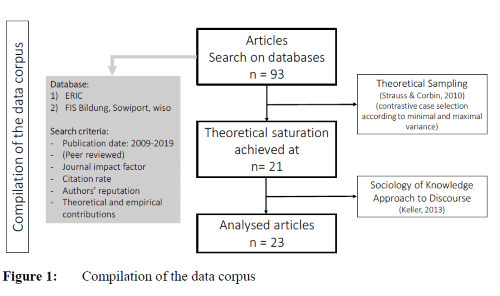
To compile the data corpus, a database search (ERIC) with the search terms ‘giftedness’ AND ‘inclusion’ OR ‘diversity’ was initially used to retrieve key texts according to the criteria ‘peer review’ and reputation of the authors. During the database search, however, it became apparent that no German-language journals with the claim of peer review were listed in the Eric database or in the Social Sciences Citation Index (SSCI). Following the research question, the search was therefore extended in a further step to include the databases FIS Bildung, Sowiport and wiso, which are established in German-speaking countries. The restriction to formally listed peer-reviewed journal articles had to be dispensed with in favour of a broader selection of articles, as only two journals in German language are considered to have peer-review procedures. Thus, in addition to the journal articles, thematically relevant anthology articles were also included in the sample, and attention was paid here to the reputation of the authors in the field of gifted education because it can be reasonably assumed that this also influences the perception of the publications in the scientific field of giftedness promotion. The scientific discourse can be seen as significantly controlled by this an thus discourse power of the contributions found in this way can be presumed. However, the category of thematic focus in the field of gifted education and the number of publications by authors with a focus in the thematic field were the primary criteria. Advice literature was excluded from the data collection due to the lack of comparability of text structure and addressees.
As a result, a total of 93 articles published between 2008 and 2019 in journals and edited volumes met the general search criteria. In the further course of theoretical sampling (Glaser/Strauss 1998) within the analysis process and along the more precise selection criteria, a corpus of 23 reference texts emerged according to maximum and minimum variance, which formed the subject of the in-depth analysis of the discourse on giftedness, achievement, and inclusion (summarised in anonymised form in Table 1).
Following Keller’s (2013) Sociology of Knowledge Approach to Discourse (SKAD), we first examined the situatedness and material nature of the data corpus within the framework of the interpretative analysis and then took a look at the formal and rhetorical-linguistic structure. This is where the interpretative-analytical reconstruction of the textual material began. Following the procedure of Grounded Theory (Glaser/Strauss 1998; Strauss/Corbin 1996), it was examined in terms of its phenomenal structure and the interpretative and narrative patterns (cf. Keller 2013: 28). Our approach is thus based on sociologically founded research procedures of discourse analysis but is here concretised in the context of an educational research question in a meaningful and subject-related way.
Theoretical sampling and analysis
The aim of theoretical sampling is to dovetail case or data selection and data evaluation. In this process, the iterative selection and analysis of the material enables a procedural process of knowledge (Glaser/Strauss 1998). In doing so, deliberately contrasting and mutually irritating or validating texts are selected. This enables a successive specification in that, on the one hand, the range of the discourse on giftedness, achievement, and inclusion is reflected
and, on the other hand, the analysis of the discourse is differentiated through variations by drawing on similar comparative texts (cf. Glaser/Strauss 1998: 55; Kelle/Kluge 2010; Strübing 2008). Within the framework of open, axial, and selective coding, the analytical process aims at the formation of central categories characterising the relationship between giftedness, achievement, and inclusion. These are not to be understood as describing and reducing but as categories that are condensed in terms of their theoretical content (Strauss/ Corbin 1996), which elaborate the phenomenal structure underlying the texts and reveal interpretative patterns through the sequential procedure. The contrastive comparison of the texts contributes to the condensation by sharpening, developing and, where necessary, revising categories (cf. Keller 2013). Through this, the connection between giftedness, achievement, and inclusion is illuminated and increasingly abstracted in terms of the narrative structure, based on the textual material studied (cf. Przyborksi/Wohlrab-Sahr 2014: 209; Keller 2013: 28).
3 Key Findings of the Discourse Analysis
The analysis of the discourse on giftedness, achievement, and inclusion points across texts to a narrative structure that aims to first (1) clarify and locate the concept of giftedness from a disciplinary perspective. In a second step (2), with reference to educational policy agendas, the figure of dichotomisation is used to construct two opposing risk groups that (3) require specific pedagogical approaches, which are finally (4) justified with the underlying dispositif of giftedness and achievement (see Fig. 2).
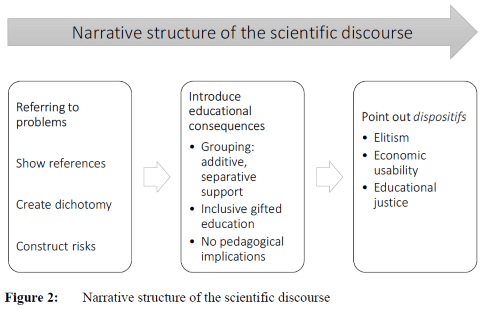
***
Would you like to read more?
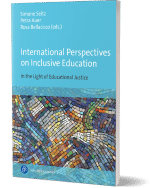 You can purchase the book as a print book or download it in our shop:
You can purchase the book as a print book or download it in our shop:
International Perspectives on Inclusive Education. In the Light of Educational Justice
edited by Simone Seitz, Petra Auer and Rosa Bellacicco
